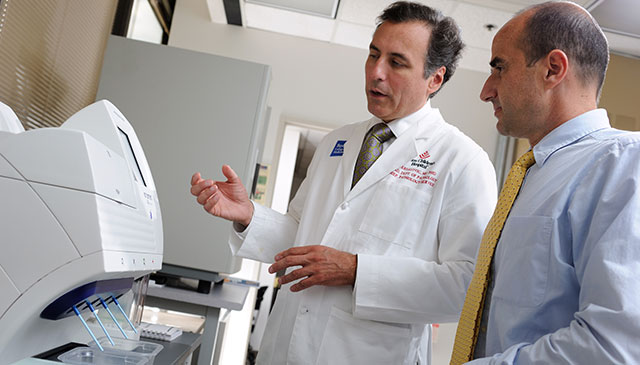
Dr. Richard Kellermayer, director of the Pediatric Inflammatory Bowel Disease program at Texas Children’s, has devoted much of his research to improving outcomes for children with chronic intestinal inflammation such as inflammatory bowel disease (Crohn’s disease and ulcerative colitis), as well as young patients who suffer from recurrent Clostridium difficile (C. diff) infections.
“C. diff is a bacterium that causes diarrhea and inflammation of the colon, which can be severe on occasions,” said Kellermayer, associate professor of Pediatrics at Baylor College of Medicine. “Some patients are susceptible to C. diff recurrences following repeated treatment with antibiotics. It can be increasingly challenging to successfully treat these patients with conventional methods.”
In a recently published paper in the Journal of Pediatric Gastroenterology and Nutrition, Kellermayer and his colleagues provide guidelines for the safe use of fecal microbiota transplantation to treat children with recurrent C. diff infections who are unresponsive to standard antibiotic treatments. This paper resulted from the collaborative efforts of leading experts in the North American Society for Pediatric Gastroenterology, Hepatology and Nutrition (NASPHGAN) and the European Society for Pediatric Gastroenterology, Hepatology and Nutrition (ESPGHAN).
Texas Children’s is among few hospitals across the nation exploring fecal microbiota transplantation (FMT), a nonconventional treatment that delivers stool from healthy donors into the colon of patients with C.diff in an attempt to restore a healthy, diverse bacterial population in the gut. C. diff infection is commonly associated with the microbial imbalance created in the gut due to frequent or prolonged use of antibiotics. This lack of microbial diversity allows the bacterium to grow excessively and produce toxins that cause diarrhea and other symptoms.
FMT has been used to manage recurrent C. diff infections in adult patients, with the cure rates approaching 90 percent. While it is not fully understood how FMT works, it is believed that the transfer of stool from a healthy donor helps repopulate the recipient’s gut with many kinds of beneficial bacteria, which discourages excessive growth of C. diff.
Kellermayer along with leading experts in the field noted in the paper that the incidence of C. diff infection among hospitalized, as well as healthy children in the community, has increased dramatically in the last decade. Pediatric patients can also have recurrent infections, similar to adults while being treated with C. diff directed antibiotics.
“Repeated and prolonged use of antibiotics in children may increase their risk of developing other gastrointestinal disorders later in life,” Kellermayer said. “So, better treatment options are urgently needed to treat children with recurrent C. diff infection, and FMT seems to provide a safe and effective treatment option for these patients at present. The collaboration between our IBD program and the Texas Children’s Microbiome Center, led by Drs. James Versalovic and Tor Savidge, provides an outstanding opportunity for us to advance FMT research. We are very grateful to our benefactors led by the Wagner and Klaasmeyer families, who support our research through the Gutsy Kids Fund.”
New study underway to analyze genetic implications of complicated pediatric Crohn’s disease
In a separate study funded by the Crohn’s and Colitis Foundation, Kellermayer and his research colleagues at Texas Children’s and Baylor College of Medicine will study the genetic background of complicated pediatric Crohn’s disease, a type of chronic, inflammatory bowel disease that can affect any part of the gastrointestinal tract.
“We will conduct high-throughput, genome wide genetic analysis on patients with Crohn’s disease to see if we can find any new genes that shed light on the most aggressive forms of the disorder and what makes certain people prone to developing it,” Kellermayer said. “If we know the genetic associations, we might find new means of prevention and treatment in the future.”

